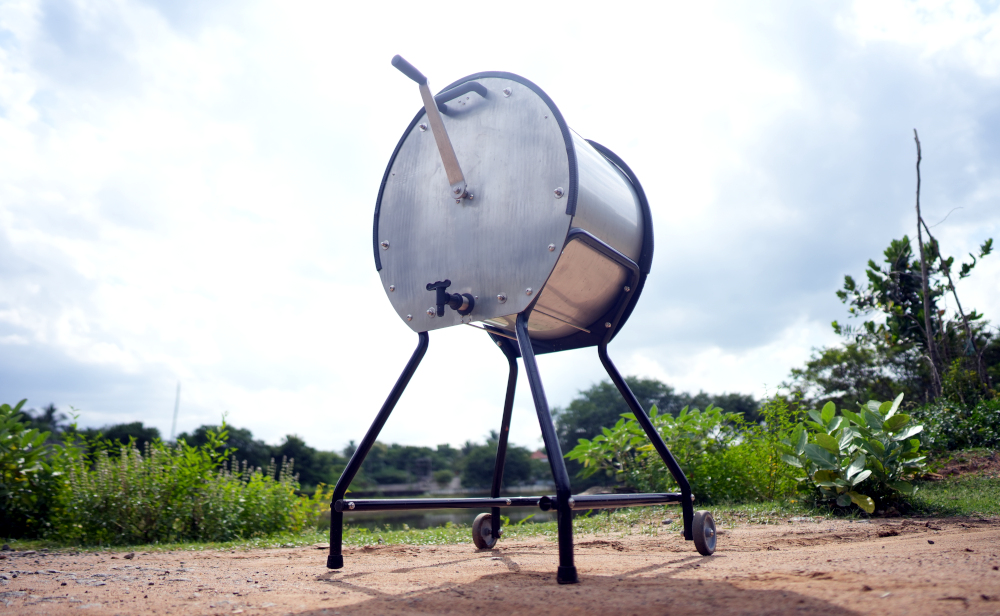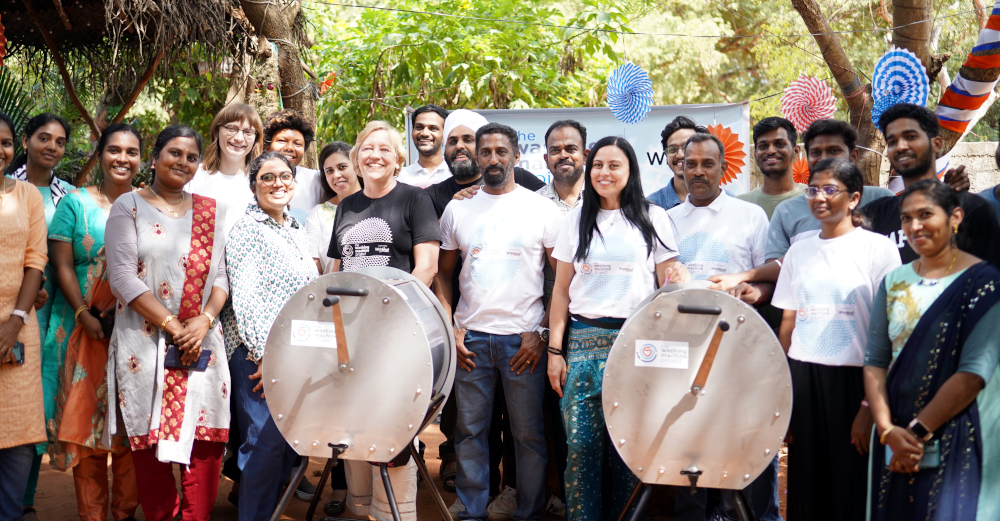Imagine washing clothes by hand for up to 20 hours each week. This is a reality
for more than 5 billion people worldwide. In remote villages and settlements —
many lacking electricity or running water — this chore drains time and
perpetuates gender
inequalities
as women and girls shoulder the work.
This "Global Washing Divide" is reality for the more than 60 percent of the
world who hand-wash clothes
daily. In
developing countries, the time spent on this task can equal 1,000 hours each
year — the equivalent of a year’s worth of schooling or a part-time job — a loss
that cripples the potential of individuals, families and entire communities.
Against this backdrop, The Washing Machine
Project — founded by Nav
Sawhney, an engineer moved by the
plight of a neighbor — has joined forces with the Whirlpool
Foundation.
Together, they are scaling distribution of Sawhney’s innovative, hand-cranked
washing machine to help women and girls in remote areas reclaim time for
education, work, and personal growth — ushering in a new era of laundry
technology designed to clean clothes and eliminate persistent social barriers.
The genesis of The Washing Machine Project
Sawhney began his engineering career at Dyson,
designing high-end appliances. Despite landing what he thought was his dream
job, he felt unfulfilled and left to join Engineers Without
Borders in India. There, he
met a neighbor — Divya — and experienced firsthand her reality: hand-washing
her household’s clothing for hours a day. All around him, women and girls faced
the same toil — washing clothes at home and in often unsanitary rivers and
lakes.
“I was struck by the consistent application of effort that Divya put into the
chore,” Sawhney said. “She washed for hours — sacrificing the health of her skin
and body to provide her family with clean clothes. It was both a source of pride
and pain for her.”
Sawhney also understood how this disproportionate burden of unpaid domestic work
prevented women and girls from pursuing meaningful opportunities — so, he left
India determined to find a solution.
Sawhney returned to the UK and pursued an MSc in Humanitarianism, Conflict
and International Development at The University of
Bath. He founded The Washing Machine Project in 2018
in his mother’s London flat. Starting with a prototype inspired by a salad
spinner, the project gradually evolved — with Sawhney naming the machine "The
Divya" in honor of his inspiration and friend.
Through partnerships with organizations including Oxfam, The Washing Machine
Project began distributing machines to communities globally, gathering
invaluable feedback to refine the design. A boots-on-the-ground approach helped
gain input that would help inform future iterations of the machine, but one
question remained: How could they scale manufacturing to start bridging the
global washing divide?
Strategic synergies
 The Divya Washing Machine | Image credit: Washing Machine Project
The Divya Washing Machine | Image credit: Washing Machine Project
Around the same time, a related question was asked in the Whirlpool
Corporation’s home of Benton Harbor, Michigan. For years, Deb
O’Connor — Managing Director
of the Whirlpool Foundation — and her team had been exploring utilizing
Whirlpool’s extensive manufacturing expertise to solve this global issue, as
part of the Whirlpool Foundation’s ongoing work.
“We had thousands of talented employees and world-class manufacturing
facilities,” O’Connor said. “Yet, to close the global washing divide and help as
many people as possible, we needed a solution to scale our reach and impact.”
When Sawhney's initiative caught their attention, the Whirlpool team reached out
for an introductory conversation. Recognizing each other's strengths, they
joined forces to scale the production and distribution of The Divya.
Unlocking 17M hours for women and girls
In April 2024, the two organizations announced a five-year global
effort
to help women and girls reclaim millions of hours of lost time. With a robust
plan to build and distribute 10,000 Divya machines over the next five years, the
collaboration aims to impact more than 150,000 people worldwide.
“This innovation is more than a washing machine; it's an educational and
economic empowerment engine, especially for women and girls in developing
regions,” Sawhney said.
Whirlpool employee volunteers are an important piece of the collaboration —
volunteering their time to assemble Divya machines; assist in sourcing and
developing materials; and help scale production in places including India,
Mexico and the Republic of Congo.
“Our employees have responded to the Divya program beyond our expectations,”
O’Connor said. “When they learn about the burden from hand-washing clothes and
the impact of the machine on recipients’ lives, building the Divya becomes very
personal. There is a long waitlist to participate in the construction of the
machines, which we’re working to scale rapidly to meet demand.”
Impact through innovation
 Members of The Washing Machine Project and the Whirlpool Foundation teams
present two Divya washing machines to the Kuilapalayam community | Image
credit: Washing Machine Project
Members of The Washing Machine Project and the Whirlpool Foundation teams
present two Divya washing machines to the Kuilapalayam community | Image
credit: Washing Machine Project
In addition to being hand-cranked, the Divya is the world’s first packable
washing
machine.
This feature reduces shipping costs and enables women and girls to assemble
their Divya from the start, giving them a better understanding of how it works.
The machines are also built with off-the-shelf parts, making local repair
feasible if necessary.
The first machines built by the two organizations were designated for delivery
to Divya herself in India.
As Whirlpool and The Washing Machine Project continue to expand their
transformative collaboration, several insights have fueled their progress:
-
Identify shared vision and expertise: These are the foundation of
successful collaborations and can help amplify impact and drive meaningful
change.
-
Leverage resources and networks: Collaborators can achieve more together
than individually. By leveraging each other’s strengths, collaborators can
scale initiatives, access new markets and reach a broader audience.
-
Co-creating solutions with local communities: Engaging communities as
active participants in
solutions
fosters ownership, resilience and lasting impact — driving positive change
from the ground up.
By continuing to focus on collaborative strength and community empowerment, The
Washing Machine Project and Whirlpool Foundation are revolutionizing laundry
practices and creating lasting benefits — one wash at a time.
Get the latest insights, trends, and innovations to help position yourself at the forefront of sustainable business leadership—delivered straight to your inbox.
Carol is internationally recognized for her work in Purpose and CSR. Carol Cone ON PURPOSE is the return to her entrepreneurial roots and life’s passion: to educate, inspire and accelerate purpose programs and impacts for organizations, nonprofits and individuals around the globe.
Published Jun 19, 2024 8am EDT / 5am PDT / 1pm BST / 2pm CEST